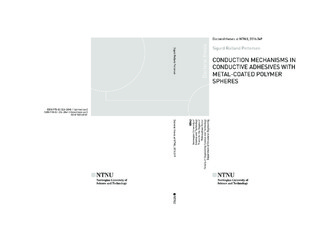| dc.contributor.advisor | He, Jianying | |
| dc.contributor.advisor | Zhang, Zhiliang | |
| dc.contributor.advisor | Kristiansen, Helge | |
| dc.contributor.author | Pettersen, Sigurd Rolland | |
| dc.date.accessioned | 2017-01-31T13:12:03Z | |
| dc.date.available | 2017-01-31T13:12:03Z | |
| dc.date.issued | 2016 | |
| dc.identifier.isbn | 978-82-326-2041-8 | |
| dc.identifier.issn | 1503-8181 | |
| dc.identifier.uri | http://hdl.handle.net/11250/2429055 | |
| dc.description.abstract | Isotropic conductive adhesives (ICAs), i.e. polymer adhesives with a percolating network of filler particles embedded for conductivity, have been used as alternatives to soldering in electronic devices for decades. More recently, the photovoltaic (PV) industry have begun to show major interest in ICAs, as this is a low-temperature alternative to lead-free solders. Lower processing temperatures decrease solar cell damage and allows for the use of thinner wafers, which can be a significant contribution to the cost-reduction of PV modules. However, conventional ICAs contain large amounts (> 25 vol%) of silver, and are thus expensive.
The goal of this thesis has been to investigate the mechanisms controlling electrical and thermal conduction in a new type of ICAs. By replacing the micron-sized silver flakes and solid particles of conventional ICAs with micron-sized polymer spheres coated with silver thin films (AgPS), a conductive network can be formed throughout the adhesive matrix at silver contents in the range of ~ 0.5 – 5 vol%. The similar thermomechanical properties of the polymer cores and adhesive matrix, which together comprise > 95 vol% of the ICA, can improve the reliability of the interconnects. A major disadvantage with these ICAs is that they typically yield higher resistivities than conventional ICAs, although the silver is more efficiently used in the former. By understanding the factors limiting the electrical and thermal conductivities of the ICAs, strategies for improving these can be devised.
In this work, we have developed two distinct methods for investigating the electromechanical properties of individual AgPS. A major finding has been that for films thinner than ~ 100 nm the electrical resistivity of the silver films increase drastically. We have discovered that when incorporated into epoxy adhesive, the AgPS can form metallic contacts even when cured at room temperature, and that these are sintered into metallurgical contacts at a curing temperature of 150 °C. We found that the grains of the silver films partake in an electrochemical, size-related growth process when the ICAs are exposed to elevated heat and humidity. This growth process has a positive impact on conductivity of the ICAs in the absence of a bias voltage, and is amplified by lower cross-linking of the epoxy matrix. We also investigated the thermal properties of AgPS-based ICAs with the flash diffusivity method, and found that the thermal conductivity was heavily dependent on the measurement method used to obtain the specific heat capacity. | nb_NO |
| dc.language.iso | eng | nb_NO |
| dc.publisher | NTNU | nb_NO |
| dc.relation.ispartofseries | Doctoral theses at NTNU;2016:349 | |
| dc.relation.haspart | Paper 1:
Bazilchuk, Molly Strimbeck; Pettersen, Sigurd Rolland; Kristiansen, Helge; Zhang, Zhiliang; He, Jianying.
Electromechanical characterization of individual micron-sized metal coated polymer particles. Journal of Applied Physics 2016 ;Volum 119.(24)
http://dx.doi.org/10.1063/1.4954218
© 2016 AIP Publishing | |
| dc.relation.haspart | Paper 2:
Pettersen, Sigurd Rolland; Stokkeland, August Emil; Kristiansen, Helge; njagi, john; Redford, Keith; Goia, Dan; Zhang, Zhiliang; He, Jianying.
Electrical four-point probing of spherical metallic thin films coated onto micron sized polymer particles. Applied Physics Letters 2016 ;Volum 109.(4)
http://dx.doi.org/10.1063/1.4959783
© 2016 AIP Publishing | |
| dc.relation.haspart | Paper 3:
Pettersen, Sigurd Rolland; Kristiansen, Helge; Nagao, Shijo; Helland, Susanne; njagi, john; Suganuma, Katsuaki; Zhang, Zhiliang; He, Jianying.
Contact Resistance and Metallurgical Connections Between Silver Coated Polymer Particles in Isotropic Conductive Adhesives. Journal of Electronic Materials 2016 ;Volum 45.(7) s. 3734-3743
http://dx.doi.org/10.1007/s11664-016-4498-1
Distributed under the terms of the Creative Commons Attribution 4.0 International License (http://creativecommons.org/licenses/by/4.0/), | |
| dc.relation.haspart | Paper 4:
Pettersen, Sigurd Rolland; Kristiansen, Helge; Redford, Keith; Helland, Susanne; Kalland, Erik; Zhang, Zhiliang; He, Jianying.
Controlling the Conduction Mechanisms in Isotropic Conductive Adhesives with Silver-Coated Polymer Spheres. I: 2016 IEEE 66th Proceedings Electronic Components and Technology Conference (ECTC), 2016 s. 2494-2500
Is not included due to copyright available at
http://dx.doi.org/10.1109/ECTC.2016.53 | |
| dc.relation.haspart | Paper 5:
Pettersen, Sigurd Rolland; Redford, Keith; njagi, john; Kristiansen, Helge; Helland, Susanne; Kalland, Erik; Zhang, Zhiliang; He, Jianying.
Room-Temperature Curing and Grain Growth at High Humidity in Conductive Adhesives with Ultra-Low Silver Content. - Final published version available in
Journal of Electronic Materials 2017
http://dx.doi.org/10.1007/s11664-017-5376-1 | |
| dc.relation.haspart | Paper 6:
Pettersen, Sigurd Rolland; Nagao, Shijo; Kristiansen, Helge; Helland, Susanne; njagi, john; Suganuma, Katsuaki; Zhang, Zhiliang; He, Jianying.
Investigation of thermal transport in polymer composites with percolating networks of silver thin films by the flash diffusivity method. -
Final published version available in Journal of Applied Physics 2017 ;Volum 121.(2)
http://dx.doi.org/10.1063/1.4973682
© 2017 AIP Publishing | |
| dc.title | CONDUCTION MECHANISMS IN CONDUCTIVE ADHESIVES WITH METAL-COATED POLYMER SPHERES | nb_NO |
| dc.type | Doctoral thesis | nb_NO |
| dc.subject.nsi | VDP::Technology: 500::Building technology: 530::Construction technology: 533 | nb_NO |

